【设计】六年级英语上册Unit8Doyouhaveasoccerball第2课时教学设计鲁教版五四制
六年级英语上册Unit8DoyouhaveasoccerballPeriod2SectionA(2a
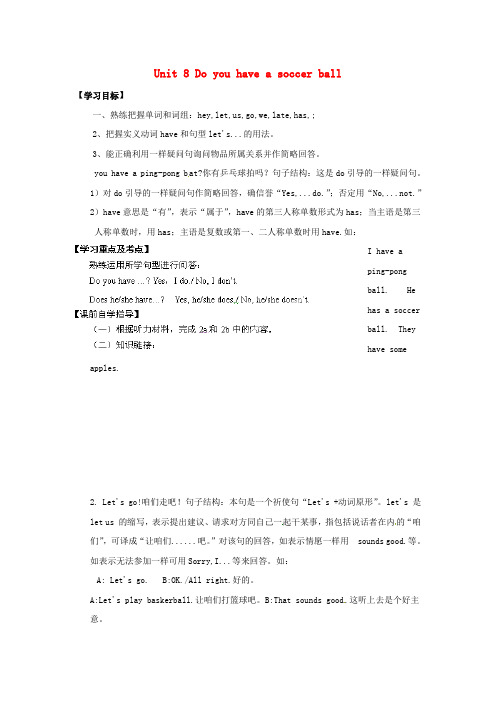
Unit 8 Do you have a soccer ball【学习目标】一、熟练把握单词和词组:hey,let,us,go,we,late,has,;2、把握实义动词have和句型let's...的用法。
3、能正确利用一样疑问句询问物品所属关系并作简略回答。
you have a ping-pong b at?你有乒乓球拍吗?句子结构:这是do引导的一样疑问句。
1)对do引导的一样疑问句作简略回答,确信誉“Yes,...do.”;否定用“No,...not.”2)have意思是“有”,表示“属于”,have的第三人称单数形式为has;当主语是第三人称单数时,用has;主语是复数或第一、二人称单数时用have.如:I have aping-pongball. Hehas a soccerball. Theyhave some apples.2. Let's go!咱们走吧!句子结构:本句是一个祈使句“Let's +动词原形”。
let's 是let us 的缩写,表示提出建议、请求对方同自己一起干某事,指包括说话者在内的“咱们”,可译成“让咱们......吧。
”对该句的回答,如表示情愿一样用 sounds good.等。
如表示无法参加一样可用Sorry,I...等来回答。
如:A: Let's go. B:OK./All right.好的。
A:Let's play baskerball.让咱们打篮球吧。
B:That sounds good.这听上去是个好主意。
A:Let's watch TV.让咱们看电视吧。
B:Sorry,I have to do my homework first.对不起,我得先做家庭作业。
are late!咱们迟到了!句子结构:这是陈述句。
late是形容词,用在be后作表语,说明主语的状态。
He is always late.他老是迟到。
鲁教版六年级上册 Unit 8 Do you have a soccer ball PPT课件

A: Let’s play… .
B: I don’t have a … .
A: Well, let’s play … . B: That sounds good .
1
2
3
4
ቤተ መጻሕፍቲ ባይዱ
Game :Guess the action (猜动作)
play volleyball
Homework:
1) . Practice the conversations.
2). Finish off your exercise
…. B: That sounds ….
A: Let’s
books. 3). Preview SectionB1a-2c.
Ask and answer:
A: Let’s play… B: That sounds good.
B:No, I don’t A:Let’s play have a ping-pong ping-pong . ball . B:I don’t have Conversation2 A: Let’s play tennis . a tennis racket .
Conversation3
Conversation1
B:That sounds good .
A:Well, let’s play soccer .
A: Let’s play soccer.
B: I don’t have a soccer ball.
A: Well, let’s play baseball.
play soccer
Do you play tennis? Do you play volleyball? We have many sportsclubs(运动俱乐部): basketball, ping-pong, soccer and more(更多的)!
英语鲁教版六上Unit8Doyouhaveasoccerball教案
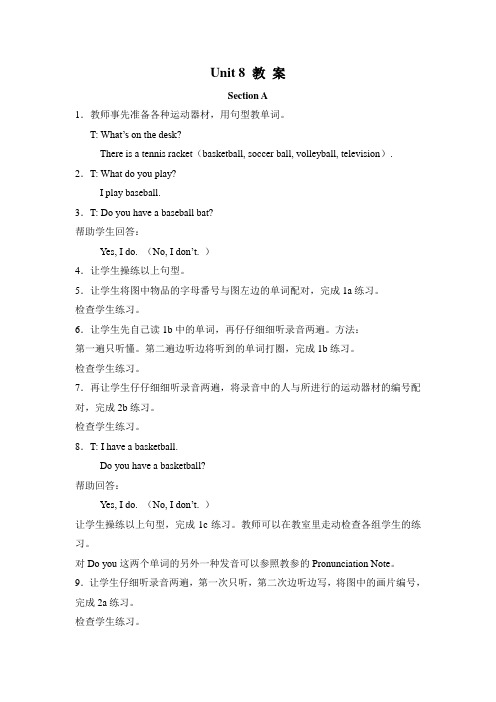
Unit 8 教案Section A1.教师事先准备各种运动器材,用句型教单词。
T: What’s on the desk?There is a tennis racket(basketball, soccer ball, volleyball, television). 2.T: What do you play?I play baseball.3.T: Do you have a baseball bat?帮助学生回答:Yes, I do. (No, I don’t. )4.让学生操练以上句型。
5.让学生将图中物品的字母番号与图左边的单词配对,完成1a练习。
检查学生练习。
6.让学生先自己读1b中的单词,再仔仔细细听录音两遍。
方法:第一遍只听懂。
第二遍边听边将听到的单词打圈,完成1b练习。
检查学生练习。
7.再让学生仔仔细细听录音两遍,将录音中的人与所进行的运动器材的编号配对,完成2b练习。
检查学生练习。
8.T: I have a basketball.Do you have a basketball?帮助回答:Yes, I do. (No, I don’t. )让学生操练以上句型,完成1c练习。
教师可以在教室里走动检查各组学生的练习。
对Do you这两个单词的另外一种发音可以参照教参的Pronunciation Note。
9.让学生仔细听录音两遍,第一次只听,第二次边听边写,将图中的画片编号,完成2a练习。
检查学生练习。
10.让学生带运动器材到教室。
分组拿实物用Do you have a...?Yes, I do.(No, I don’t. )的句型进行操练。
教师可以在教室里走动巡视。
检查各学生小组的活动情况。
11.让同桌学生两人一组共同看画片,用10.的句型进行问答,教师走到各小组听他们的发音,检查他们的口语练习,完成3的练习。
12.用句型:T: Do you have a...?S: Yes, I do. (No, I don’t. )引入:T: Does he/she have a...?帮助学生回答:Yes, he/she does.No, he/she doesn’t.让学生拿出事先准备好的运动器材,分组进行口语练习。
六年级英语上册 Unit 8 Do you have a soccer ball 课件 鲁教版

10._D_o__ we _h_a_v_e a soccer ball?
Yes,___w__e _d_o____.
11. I h__a_v_e_ a ball.
12.You _h_a_v_e__ some milk.
13.They__h_a_v_e_some pears. 14. He ___h_a_sa ping-pong. 15.She _h__a_s_ an orange. 15.LI Lei__h_a__sa pencil.
2. 变为否定句 :
eg. I have a book. I don’t have a
book.
You don’t have a book.
1.You have a desk.
We don’t have 6 bikes.
2.We have 6 bikes. They don’t have a room.
4D. _o_e_s_she _h_a_v_e2 books?
No, s_h__e_d_o_e_s_n. ’t
5D. _o_e_s_Amyh_a_v_e_ 5 eggs?
No,s_h_e__d_o_e_s_n.’t
6D. _o_e_s_Mikeh__a_v_e a baseball? Yes,__h_e_ _d_o_e_s.
Do you have a soccer ball?
Yes
No
Yes, I do.
No, I don’t.
I have a soccer ball. I have a baseball.
Does he have a backpack?
Yes
No
Yes, he does.
No, he doesn't.
鲁教版英语六年级上Unit8 Do you have a soccerball 学案

课题:Unit 8 Do you have a soccer ball? Section B 2a-3b 序号:_年级:六年级科目:English 课型:New 主备人时间审核人学习目标。
词汇:watch , has ,great, collection, but, only , them , every , day ,watch TV, play sports, every day句型:Ed Smith has a great sports collection.But he doesn’t play sports-- he only watches them on TV.She plays sports every day.能力:能运用英语准确的介绍自己或他人的收藏品。
学习过程一、学习词汇:朗读,记忆。
二、自学导航:根据自学或查阅课本,准确快速写出下列单词/词组。
1、玩电脑游戏________2、看电视_________3、参加体育运动__________4、大量的体育收藏品___________________5、每天___________6、羽毛球拍_________7、they(宾格)_________8、只,仅仅__________三、通读3a,翻译课文的意思。
谈谈如何掌握好以下重点的句型。
Ed Smith has a great sports collection.But he doesn’t play sports--he only watches them on TV.(on表示通过一定的媒介,运用一定的工具、手段)四、Look at the picture on Page 47, and finish off the short passage ,payattention to the important sentence :She plays sports every day.五、五分钟考考你的记忆力:A组争取复述B,C组背诵三个重点句训练检测:一、听力训练:2a-2b,注意听取关键词,订正答案。
unit8doyouhaveasoccerball教案鲁教版六年级上册

Unit 8 Do you have a soccer ball?一. [话题] (Topic) spending time with friends二. [重点词汇] (Key words)day tennis racket bat volleyball basketball television sport center club class good many interesting boring fun difficult relaxing small well great have has does let play like三. [交际用语]1. Do you have a TV?Yes, I do. /No, I don’t.2. Do they have computer?Yes, they do. / No, they don’t.3. Does he /she have a soccer ball?Yes, he/she does. No, he/she doesn’t.4. Does Chi young have a baseball?Yes, he does. / No, he doesn’t.5. Let’s play soccer.6. I don’t have a soccer ball.7. Well, Let’s play volleyball.8. That sounds good.四. [重点难点释义] (Language Points)Section ADo you have a ping-pong ball?这是一个现在时行为动词(do) 的一般疑问句,其中have 是实义动词, 表示"某人拥有"。
句中do为助动词,没有实际意义。
只是帮助构成句式。
例如:Do you have a watch?你有手表吗?主语have是英语中很有用的动词,基本含义是“有”。
六年级英语上册 Unit 8《Do you have a soccer ball》同步练习2 鲁教版
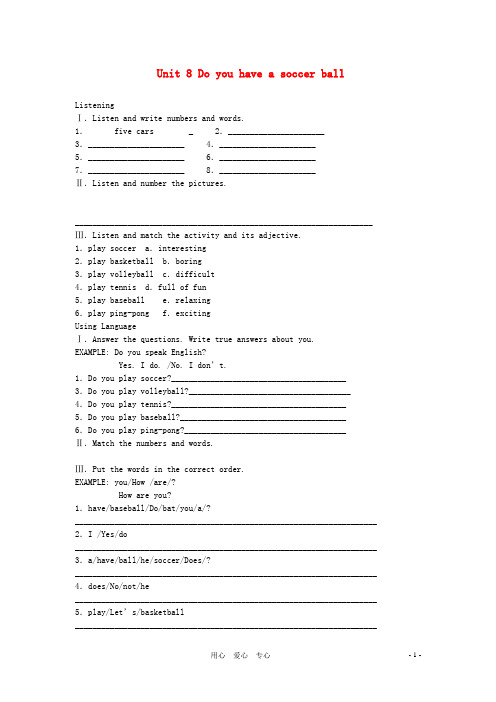
Unit 8 Do you have a soccer ballListeningⅠ.Listen and write numbers and words.1. five cars _ 2.______________________3.______________________ 4.______________________5.______________________ 6.______________________7.______________________ 8.______________________Ⅱ.Listen and number the pictures.____________________________________________________________________ Ⅲ.Listen and match the activity and its adjective.1.play soccer a.interesting2.play basketball b.boring3.play volleyball c.difficult4.play tennis d.full of fun5.play baseball e.relaxing6.play ping-pong f.excitingUsing LanguageⅠ.Answer the questions. Write true answers about you.EXAMPLE: Do you speak English?Yes. I do. /No. I don’t.1.Do you play soccer?________________________________________3.Do you play volleyball?_____________________________________ 4.Do you play tennis?________________________________________5.Do you play baseball?______________________________________6.Do you play ping-pong?_____________________________________ Ⅱ.Match the numbers and words.Ⅲ.Put the words in the correct order.EXAMPLE: you/How /are/?How are you?1.have/baseball/Do/bat/you/a/?_____________________________________________________________________ 2.I /Yes/do_____________________________________________________________________ 3.a/have/ball/he/soccer/Does/?_____________________________________________________________________ 4.does/No/not/he_____________________________________________________________________ 5.play/Let’s/basketball_____________________________________________________________________6.interesting/sounds/good/and/That_____________________________________________________________________7.has/sports/a/Susan/small/collection_____________________________________________________________________ 8.doesn’t/play/He/sports_____________________________________________________________________ Ⅳ.Complete the conversations.1.—Who’s that boy over there?— ________ Zhao Yang.— What is his favourite sport?— He likes ________ football.2.— Zhang Ming, shall we ________ basketball?— Well, I ________ like basketball.— What ________ you like then?— I like tennis.3.— Pierre, ________ play baseball.—No, I don’t like it.— Shall we go to play volleyball?—Ok, Let’s ________.4.—Hi, Sam! Let’s go and play ping-pong.—Sorry, I don’t have a ________ What about________?—Ok. Baseball is interesting. But I don’t have the ________.—Don’t worry. I have two bats and I can lend you one.— Thank you.Let’s go.Ⅴ.Choose the correct answers.1.He ________ football every day.A.play B.plays C.playing2.________ he have a tennis racket?A.Does B.Do C.Is3.We have many ________.A.club B.clubs C.many club4.— Do you have a soccer ball?— ________A.Yes, I am. B.Yes, I don’t. C.No, I don’t.5.Let’s ________ volleyball.A.play B.plays C.playing6.— What about ________ basketball?—Ok. Let’s go.A.play B.plays C.playing7.— Do you have ________ ?— ________ I have a ball.A.a ball; Yes, I do. B.ball; Yes, I do. C.a ball; No, I don’t. 8.—Let’s play tennis.— That ________ good.A.sound B.sounding C.sounds9.Sandy doesn’t ________ many pencils.A.has B.have C.to have10.Do you have some ________ sports?A.many B.more C.muchⅥ.Translation.1.Do you have a baseball?_______________________________________________ 2.He has a soccer ball. _________________________________________________ 3.Well, let’s p lay volleyball. _____________________________________________ 4.We have many clubs. _________________________________________________ 5.She only watches TV on Sunday. _______________________________________ 6.我们一起玩电子游戏吧。
六年级英语上册Unit8Doyouhaveasoccerball导学案1无答案鲁教版五四制

Unit 8 Do you have a soccer ball学习目标:1、把握重点辞汇:have soccer ball tennis racket ping-pong volleyball basketball bat2、把握重点句型: Do you have a ping-pong ball ? Yes, I do .Do you have a ping-pong bat? No ,I do n’t3、把握各类球类名词,熟悉各类运动项。
重点难点1. 区分一、三人称:have和has; do和does;2. 一样疑问句回答及人称转变;一、知识链接谈论自己了解的球类名称,小组相互交流。
二、新课导学※自主探讨一、个人自渎,经历本课单词。
二、同桌相互检查单词读的情形。
3、小组内竞赛,看谁记得快、准,并展现(默写)有 _________ 球________ 足球__________ 网球____________ 网球拍_________排球________ 篮球 ________ 乒乓球________ (乒乓球等的)球拍_______※合作探讨1.教师别离拿出姚明、邓亚萍、贝克汉姆的照片介绍,并依照运动员所从事项目导出运动器材,利用She/He has a (an) ______.句型。
T: Look ,here are some sports stars. Do you know them? (姚明)He’s Yaoming. He has a basketball. 后面两位以此类推。
(教师展现棒球)I have a (an)______.2.教师边说边将句型写在黑板上:I have a … He has...She has a ….3.小组讨论翻译句子并写下来:我有一个足球。
____________________________她有一个排球。
_____________________________他有一个篮球。
鲁教版(五四制)六年级英语上册单元测试Unit-8-(含答案)
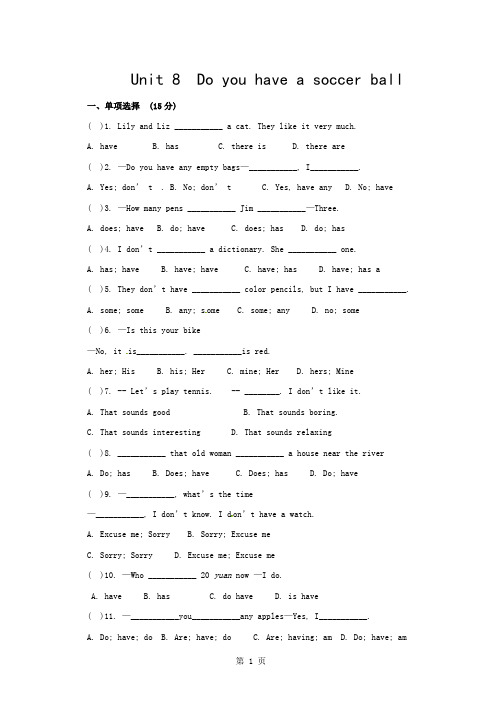
Unit 8 Do you have a soccer ball 一、单项选择 (15分)( )1. Lily and Liz ___________ a cat. They like it very much.A. haveB. hasC. there isD. there are( )2. —Do you have any empty bags—___________, I___________.A. Yes; don’ t .B. No; don’ tC. Yes, have anyD. No; have( )3. —How many pens ___________ Jim ___________—Three.A. does; haveB. do; haveC. does; hasD. do; has( )4. I don’t ___________ a dictionary. She ___________ one.A. has; haveB. have; haveC. have; hasD. have; has a( )5. They don’t have ___________ color pencils, but I have ___________.A. some; someB. any; s omeC. some; anyD. no; some( )6. —Is this your bike—No, it is___________. ___________is red.A. her; HisB. his; HerC. mine; HerD. hers; Mine( )7. -- Let’s play tennis. -- ________. I don’t like it.A. That sounds goodB. That sounds boring.C. That sounds interestingD. That sounds relaxing( )8. ___________ that old woman ___________ a house near the riverA. Do; hasB. Does; haveC. Does; hasD. Do; have( )9. —___________, what’s the time—___________, I don’t know. I d on’t have a watch.A. Excuse me; SorryB. Sorry; Excuse meC. Sorry; SorryD. Excuse me; Excuse me( )10. —Who ___________ 20 yuan now —I do.A. haveB. hasC. do haveD. is have( )11. —___________you___________any apples—Yes, I___________.A. Do; have; doB. Are; have; doC. Are; having; amD. Do; have; am( )12. —Li Wei, do you have any pencils—___________! I don’t have any.A. Excuse meB. CertainlyC. OKD. Sorry( )13. ___________, do you have a pencilA. HelloB. SorryC. Thank youD. Excuse me( )14. Kate gives___________ some books, but I must give___________ back soon.A. I; itB. me; themC. my; theyD. me; they( )15. —Do your friends have any story books—No, they___________.A. aren’tB. not haveC. don’tD. can’t二、完形填空(10分)My name is Thomas. I 16 two good friends at school. They 17 Jenny and Paul. We are good 18 . We like (喜欢) sports.Jenny is a girl. She likes playing tennis very much. She thinks (认为) it is 19. She often 20 tennis after school. And she 21 play it very well.Paul is 22 . He likes playing basketball very much. He thinks it is 23. He doesn’t like playing tennis and he thinks it is boring.I like playing tennis, 24 I like playing basketball, too (也). We play sports25 .( ) 16. A. have B. has C. am( ) 17. A. is B. am C. are( ) 18. A. boys B. friend C. friends( ) 19. A. interesting B. boring C. happy( ) 20. A. play B. play s C. playing( ) 21. A. can B. can’t C. doesn’t( ) 22. A. boy B. a boy C. a girl( ) 23. A. fun B. difficult C. boring( ) 24. A. but B. and C. /( ) 25. A. everyday B. every day C. day三、阅读理解(30分)AHello, everyone. My name is Johnson. I’m a middle school student. I am a soccer fan (迷). I play soccer after school every day. My father is a soccer fan, too. He plays soccer very well. I like playing soccer with my father very much. We have a great collection of 15 soccer balls. But my mother and my sister don’t like soccer. They only watch TV at home. They say many TV programs (节目) are very interesting.根据短文内容, 选择最佳答案。
鲁教版英语六年级上Unit8 Do you have a soccerball 学案(2)
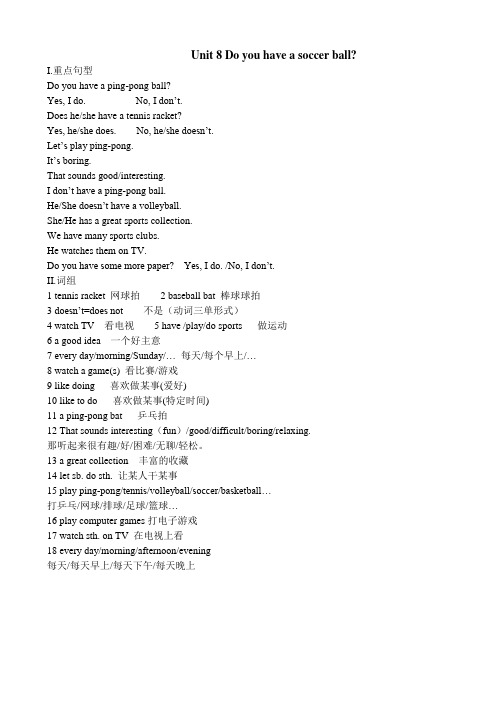
Unit 8 Do you have a soccer ball?I.重点句型Do you have a ping-pong ball?Yes, I do. No, I don’t.Does he/she have a tennis racket?Yes, he/she does. No, he/she doesn’t.Let’s play ping-pong.It’s boring.That sounds good/interesting.I don’t have a ping-pong ball.He/She doesn’t have a volleyball.She/He has a great sports collection.We have many sports clubs.He watches them on TV.Do you have some more paper? Yes, I do. /No, I don’t.II.词组1 tennis racket 网球拍2 baseball bat 棒球球拍3 doesn’t=does not 不是(动词三单形式)4 watch TV 看电视5 have /play/do sports 做运动6 a good idea 一个好主意7 every day/morning/Sunday/… 每天/每个早上/…8 watch a game(s) 看比赛/游戏9 like doing 喜欢做某事(爱好)10 like to do 喜欢做某事(特定时间)11 a ping-pong bat 乒乓拍12 That sounds interesting(fun)/good/difficult/boring/relaxing.那听起来很有趣/好/困难/无聊/轻松。
13 a great collection 丰富的收藏14 let sb. do sth. 让某人干某事15 play ping-pong/tennis/volleyball/soccer/basketball…打乒乓/网球/排球/足球/篮球…16 play computer games打电子游戏17 watch sth. on TV 在电视上看18 every day/morning/afternoon/evening每天/每天早上/每天下午/每天晚上。
Unit 8 Do you have a soccer ball 单元整体教案+课时教案(6课时)

Unit 8 Do you have a soccer ball 单元整体教案+课时教案(6课时)Unit8 Do you have a soccer ball【教学目标与要求】●话题::与朋友共度快乐时光(Spending time with friends)●功能:能够询问并描述物品所属关系(Talking about ownership)A; Do you have a ping-pong bat B: Yes, I do. / No, I don’t.A: Does she have a tennis ball B: Yes, she does. / No, she doesn’t.I don’t have a computer game.He has two ping-pong bats.●语法:1. 能够正确使用have 的一般现在时用法(Present tense to have)Do you have a volleyball Does she have a tennis ballWe have a basketball. They don’t have a basketball.He doesn’t have a soccer ball. She has a baseball.2.能够正确使用一般疑问句询问物品所属关系并做简略回答。
(Yes/ No questions and short answers)A: Do you have a tennis ball, JaneB: Yes, I do. / No, I don’t.A: Does he have a soccer ballB: Yes, he does. / No, he doesn’t.3. 能够正确使用形容词对事物发表基本看法,(adjectives of quality) Interesting, difficult, boring, relaxing, fun4. 能正确使用连词but(conjunction but)。
鲁教版英语六上Unit 8 Do you have a soccer ball 单元备课教学设计

鲁教版英语六上Unit 8 Do you have a soccer ball 单元备课教学设计一. 教材分析鲁教版英语六上Unit 8的主题是“Do you have a soccer ball?”,主要学习一般疑问句的构成和询问物品的用法。
本单元通过足球这一主题,让学生掌握询问对方是否有某物的能力,并能够在实际情境中进行运用。
教材内容丰富,包括课本、练习册、听力材料等,为学生提供多样化的学习资源。
二. 学情分析学生在学习本单元前,已经掌握了一般疑问句的基本结构,并能够用英语简单描述物品。
但部分学生对足球相关词汇的掌握较弱,需要加强。
此外,学生在实际交流中仍存在一定的困难,需要通过课堂操练来提高他们的实际应用能力。
三. 教学目标1.学生能够掌握一般疑问句的构成和用法。
2.学生能够用英语询问对方是否有某物,并能正确回答。
3.学生能够在实际情境中运用所学知识,进行流畅的交流。
四. 教学重难点1.足球相关词汇的掌握。
2.一般疑问句在实际交流中的应用。
五. 教学方法1.情境教学法:通过设置足球比赛的情境,让学生在实际环境中运用英语。
2.交际法:引导学生进行角色扮演,提高他们的交流能力。
3.任务型教学法:设计各种任务,让学生在完成任务的过程中,巩固所学知识。
六. 教学准备1.准备足球场的图片、视频等教学资源。
2.准备足球相关词汇的卡片。
3.准备课堂活动所需的教学用具。
七. 教学过程1.导入(5分钟)利用图片或视频展示足球场,引导学生谈论足球。
然后提问学生:“Do you like soccer?”,让学生用英语表达自己的观点。
2.呈现(10分钟)展示足球相关词汇的卡片,如“soccer ball”、“football”等,让学生朗读并模仿。
然后引入一般疑问句:“Do you have a soccer ball?”,让学生模仿并理解其含义。
3.操练(15分钟)设计角色扮演活动,让学生模拟足球比赛中的场景,如询问对方是否有足球。
英语六年级上册Unit 8 Do you have a soccer ball教案
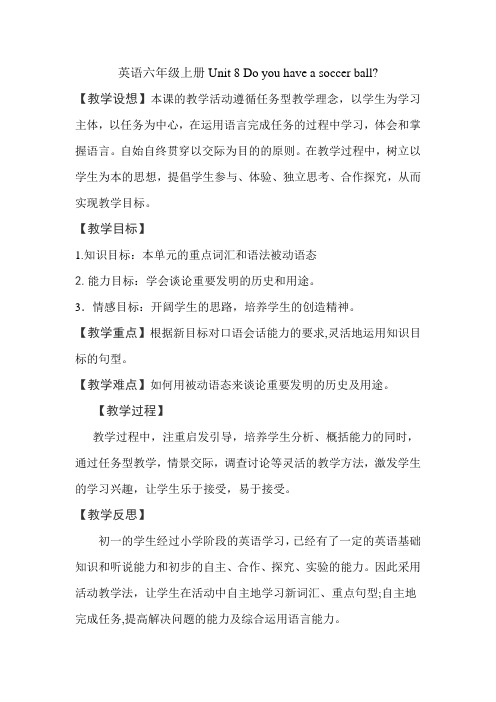
英语六年级上册Unit 8 Do you have a soccer ball?
【教学设想】本课的教学活动遵循任务型教学理念,以学生为学习主体,以任务为中心,在运用语言完成任务的过程中学习,体会和掌握语言。
自始自终贯穿以交际为目的的原则。
在教学过程中,树立以学生为本的思想,提倡学生参与、体验、独立思考、合作探究,从而实现教学目标。
【教学目标】
1.知识目标:本单元的重点词汇和语法被动语态
2.能力目标:学会谈论重要发明的历史和用途。
3.情感目标:开阔学生的思路,培养学生的创造精神。
【教学重点】根据新目标对口语会话能力的要求,灵活地运用知识目标的句型。
【教学难点】如何用被动语态来谈论重要发明的历史及用途。
【教学过程】
教学过程中,注重启发引导,培养学生分析、概括能力的同时,通过任务型教学,情景交际,调查讨论等灵活的教学方法,激发学生的学习兴趣,让学生乐于接受,易于接受。
【教学反思】
初一的学生经过小学阶段的英语学习,已经有了一定的英语基础知识和听说能力和初步的自主、合作、探究、实验的能力。
因此采用活动教学法,让学生在活动中自主地学习新词汇、重点句型;自主地完成任务,提高解决问题的能力及综合运用语言能力。
鲁教版英语六上Unit 8 Do you have a soccer ball 第六课时 教学设计

鲁教版英语六上Unit 8 Do you have a soccer ball 第六课时教学设计一. 教材分析鲁教版英语六上Unit 8 Do you have a soccer ball 第六课时主要内容是学习有关球类运动的词汇和句型,如足球、篮球、乒乓球等。
通过本节课的学习,学生能够熟练掌握球类运动的词汇,并运用句型询问和描述自己拥有的球类运动器材。
教材通过丰富的图片和情境,激发学生的学习兴趣,培养他们的观察力、思维力和表达能力。
二. 学情分析六年级的学生已经具备了一定的英语基础,能够听、说、读、写简单的英语句子。
在学习本节课时,学生应能够根据图片和情境,运用所学词汇和句型进行简单的交流。
同时,学生对球类运动有较高的兴趣,通过本节课的学习,可以进一步丰富他们的词汇量和语言表达能力。
三. 教学目标1.知识目标:学生能够掌握球类运动的词汇,如soccer, basketball,ping-pong等;能够运用句型Do you have a …? Yes, I do. / No, I don’t. 询问和描述自己拥有的球类运动器材。
2.能力目标:学生能够在图片和情境的帮助下,听、说、读、写有关球类运动的句子。
3.情感目标:通过本节课的学习,学生能够提高对球类运动的兴趣,增强团队协作和竞争意识。
四. 教学重难点1.重点:球类运动的词汇和句型Do you have a …? Yes, I do. / No, I don’t.的运用。
2.难点:球类运动词汇的准确发音和句子结构的运用。
五. 教学方法1.情境教学法:通过设置各种球类运动的情境,让学生在实际语境中学习词汇和句型。
2.任务型教学法:通过小组合作完成任务,激发学生的学习兴趣,提高他们的实践能力。
3.游戏教学法:通过设计有趣的游戏,巩固所学知识,提高学生的听说能力。
六. 教学准备1.教师准备:准备好相关球类运动的图片、视频和教学材料。
2.学生准备:提前学习本节课的生词和句型。
人教版(五四学制)六年级英语上册:Unit 8 Do you have a soccer ball?Section A 学案

Unit 8 Do you have a soccer ball?【学习内容】Section A (Grammar Focus---3c)【学习目标】1.读熟, 明白其意思并能拼写出下列单词:great, play, sound2.能够分辨出哪些人称代词是第三人称单数, 并能正确运用助动词do\does.3.能熟练使用一般疑问句询问物品所属关系并作简略回答。
4.能举出一或两个含有/tʃ/, /dʒ/ /tr/, /dr/发音的单词, 如:“chair”, “orange”, “tree”, “draw”【学习重难点】1.熟练使用一般疑问句询问物品所属关系并作简略回答。
2.第三人称单数的一般疑问句中动词的正确、熟练使用。
【学习过程】一、自学反馈1.请默读Grammar Focus表格中的句子, 观察并总结do、does分别应该在什么时候用?2.观察表格完成后请完成课本中3a部分, 看自己能否清楚地分辨出哪些人称代词是第三人称单数。
二、探究新知(一)请观察这几个句子, 总结出陈述句和一般疑问句的基本结构:1.I have a volleyball. Do you have a baseball?2.She has two Ping-pong bats. Does she has a Ping-pong ball?3.We have a soccer ball. Do they have a basketball?小组讨论后请把陈述句和一般疑问句的基本结构写出来:陈述句______________________________________________________一般疑问句__________________________________________________(二)请完成课本3b内容, 用do, does填空, 看自己学会了吗?(三)自己默读3b对话, 画出其中不懂得地方或重要的地方, 然后小组交流。
六年级英语上册 Unit 8 Do you have a soccer ball单元公开课获奖教案
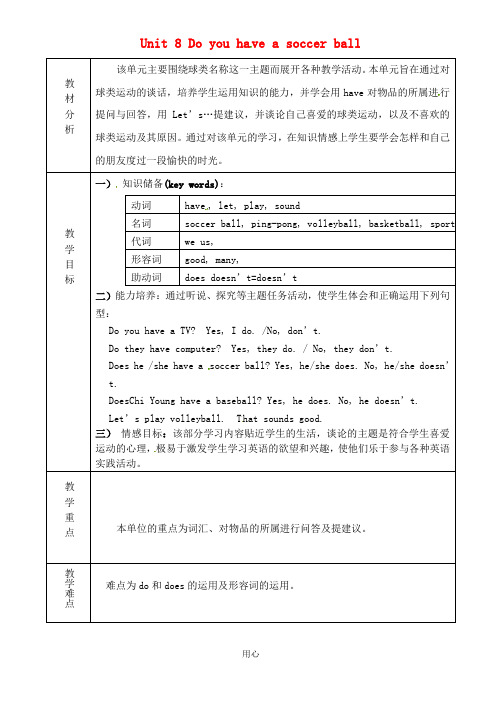
课时分配
The First Period: Section A(1a-2c)
The Second Period: Section A (2d-3c)ion B (1a-1d)
The Fourth Period: Section B (2a-2c)
教学重点
本单位的重点为词汇、对物品的所属进行问答及提建议。
教学难点
难点为do和does的运用及形容词的运用。
教学方法
学生情况分析
本单元的主题是使用have对物品的所属进行提问及回答,以掌握行为动词在一般现在时中的 构成和使用;同时引导学生使用所学的句型谈论自己在球类运动中的喜好。行为动词在一般现在时的肯定句、否定句和一般疑问句中的构成和 使用是初中英语教学中非常重要的内容,本单元知识的掌握程度将直接影响今后的英语学习。学生在以前的学习中已经掌握了be动词在一般现在时中的构成和使用,在学生的头脑中也已经形成了一个模式,这种模式将直接影响学生对本单元知 识内容的接受,所以教师在教学中一定要善于引导,以免学生养成不良习惯。
二)能力培养:通过听说、探究等主题任务活动,使学生体会和正确运用下列句型:
Do you have a TV? Yes, I do. /No, don’t.
Do they have computer? Yes, they do. / No, they don’t.
Does he /she have a soccer ball? Yes, he/she does. No, he/she doesn’t.
教学目标
一) 知识储备(key words):
动词
have , let, play, sound
名词
soccer ball, ping-pong, volleyball, basketball, sport, club
- 1、下载文档前请自行甄别文档内容的完整性,平台不提供额外的编辑、内容补充、找答案等附加服务。
- 2、"仅部分预览"的文档,不可在线预览部分如存在完整性等问题,可反馈申请退款(可完整预览的文档不适用该条件!)。
- 3、如文档侵犯您的权益,请联系客服反馈,我们会尽快为您处理(人工客服工作时间:9:00-18:30)。
【关键字】设计
Unit 8 Do you have a soccer ball?
教学目标1、知识目标:
1)Words:
have ,baseball ,
baseb all bat, let, get,
Let’s, late,
2)Target Language:
Do you have the baseball? Yes, I do.
Does he have a soccer ball? Yes, he does.
Where is our baseball bat?
2、技能目标:
能正确运用do ,does 开头的一般疑问句,并能进行肯定回答和否定回答。
3、情感态度价值观目标:
学会运用英语做好对话并了解对方的信息,增进同学和朋友之间的联系。
教学
重点
1.熟练使用一般疑问句询问物品所属关系并作简略回答。
2.第三人称单数的一般疑问句中动词的正确、熟练使用。
教学
难点
Do you have the baseball? Yes, I do.
Does he have a soccer b all? Yes, he does.
学情分析这是课本的第二部分,活动内容比较多,学生对教材很有兴趣,该部分学习内容贴近学生的生活,谈论的主题是符合学生喜爱运动的心理,极易于激发学生学习英语的欲望和兴趣,使他们乐于参与各种英语实践活动。
教学
准备
Ppt Multi—medium computer
教学过程:个性学习同层展示、自主学习(独立学习、小组合作)、师生探究、拓展训练、检测反馈/同层展示所学
集体备课个人备课
Step One: Show the preview works (text-books and note-paper) in layers. (5m)
Teacher: 1. Draw a check table on the blackboard.
2. Watch the students and gui de them to do better.
3. Show the aims for students to choose.
(At the same time, students step into the second step slowly, some by some.)
Step Two: Learn by themselves. (20m)
Students: 1. Choose learning aims. 2. Learn the new con tent.
1) Learn the new words and read and spell them correctly.
2) Role-play the conversations in 2d and try to practice in pairs. Make new conversations.
3) Read and dictate the sentences in Grammar Focus.
Teacher: Watch the students and help them whenever necessary. Gather questions.
Step Three: Discussion (5m)
Talk about the problems together.
Step Four: Practice: (10m)
1.3a. write each word in the correct place in the chart.
2. 3b Fill in the blanks with do or does. Then practice the conversations with your pa rtner.
2.3c Complete the conversation and practice it with your partner according to the picture.
Step Five: Summary and Test (5m)
Step Six: Show students how to preview for next class. (3a-3c)
Homework:
1.Preview the new words and read and spell them correctly.
2.Preview the content in 3c.
3.选做配套 P50 Ⅳ P51 VI
.
小
结:学科
知识构建与板书设计Unit 8 Do you have a soccer ball?
1)Words:
have ,baseball , baseball bat, let, get, Let’s, late, 2)Target Language:
Do you have the baseball? Yes, I do.
Does he have a soccer ball? Yes, he does.
Where is our baseball bat?
Bill has it.
Let me get it.
Let’s play.
反
思
与
重
建
附:
课前检测题:个性预习作业同层对比
课堂检测题:Translate the sentences;
1.你有乒乓球吗? 是的,我有.
2.你有乒乓球拍吗?不,我没有.
3.他有篮球吗?是的,他有.
4.你哥有网球吗?不,他没有
作业设置:
Homework:
必做:
1.Preview the new words and read and spell them correctly.
2.Preview the content in 3c.
3.选做配套 P50 Ⅳ P51 VI
此文档是由网络收集并进行重新排版整理.word可编辑版本!。
